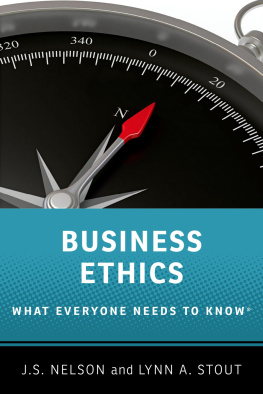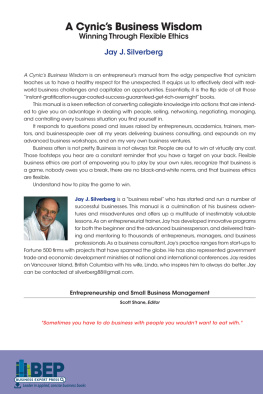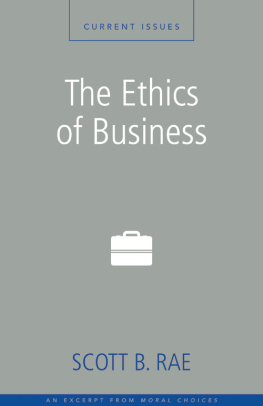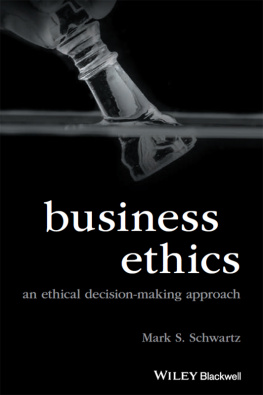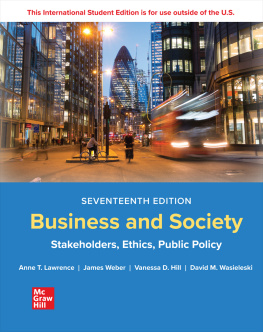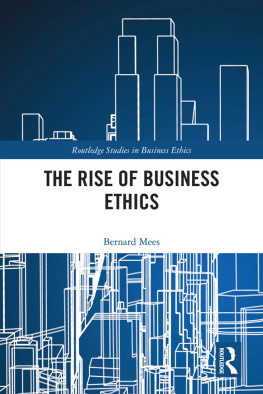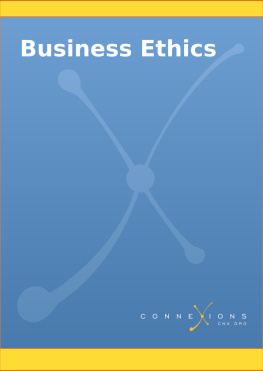BUSINESS ETHICS

Oxford University Press is a department of the University of Oxford. It furthers the Universitys objective of excellence in research, scholarship, and education by publishing worldwide. Oxford is a registered trade mark of Oxford University Press in the UK and certain other countries.
What Everyone Needs to Know is a registered trademark of Oxford University Press.
Published in the United States of America by Oxford University Press
198 Madison Avenue, New York, NY 10016, United States of America.
Oxford University Press 2022
All rights reserved. No part of this publication may be reproduced, stored in a retrieval system, or transmitted, in any form or by any means, without the prior permission in writing of Oxford University Press, or as expressly permitted by law, by license, or under terms agreed with the appropriate reproduction rights organization. Inquiries concerning reproduction outside the scope of the above should be sent to the Rights Department, Oxford University Press, at the address above.
You must not circulate this work in any other form and you must impose this same condition on any acquirer.
CIP data is on file at the Library of Congress
ISBN 9780190610265 (pbk.)
ISBN 9780190610272 (hbk.)
ISBN 9780190610296 (epub.)
Contents
Important notice: The authors of this book are not representing any client or proffering legal advice. Legal information can and does change, so readers should look up the state of the law when they need it, and they should consult their own attorneys before taking any action.
This book was a labor of love. Lynn Stout, who had been my Corporations professor at Harvard Law School, and who had kept in touch with me for nearly twenty years afterwards as I taught in business schools, asked me whether I would like to co-author a book on business ethics with her. The original idea for the book had been legendary Oxford University Press (OUP) editor Scott Parriss. He had brought the proposal to Lynn, and Lynn wanted my perspective from teaching in business schools.
We were together excited to create the first book we knew of its kind that would survey not only moral philosophy, behavioral science, economic principles, and other contributions, but to make business-law concepts accessible and understandable to businesspeople and students of law, business, and ethics. We thought it would be particularly important to talk about compliance, investigations, whistleblowing, and prosecutions as well. We wanted to end with an appendix of people and resources that anyone with questions could reach out to.
Lynn and I shaped the table of contents and its questions together. The plan was that we would each write half of the book. Lynn wrote the first chapter, and she was able to outline her ideas for the second before getting sick. She eventually succumbed after a long battle to the cancer that took her life. Her dying wish was that the Press list me on the book as first author. The Presss response was moving: that would be the ethical thing to do.
I have continued to labor since Lynns passing to bring to life this book that was her vision and a natural extension of her work. Lynn was deeply committed to popularizing business law and ethics. It is my humble honor and pleasure to be able to get this manuscript into your hands as Lynns last book, published after she has passed. She may be gone, but she will never be forgotten, and the passion of her words and educational mission live on in this book, as well as in the rest of her work.
I was helped in the completion of this work by the incredible support of my husband and children, who, particularly during the pandemic, had to contend with the book as another child demanding attention in the house. I am grateful to my mother, an English professor for some fifty years, who patiently reviewed early drafts. Christina Collins reviewed manuscripts as an editor, as well as my friend. Rosalind Wang patiently served as a sounding board and source of encouragement. The spectacular Emily Lavelle, of Lavelle Communications, helped navigate the book-publishing process, and so much more. I was cheered on in the project by my ComplianceNet co-conveners Benjamin van Rooij, Yuval Feldman, Melissa Rorie, Adam Fine, and Colin Provost. Professors in their areas of specialty, and particularly Steve Chanenson, Brett Frischmann, Andrew Lund, Jennifer OHare, Linda Trevio, Mary Gentile, Robert Prentice, Elizabeth Pollman, Ed Freeman, Marty Lipton, Miriam Baer, Don Langevoort, Usha Rodrigues, Colin Mayer, Veronica Root Martinez, Marc Cohen, Cynthia Williams, Claire Hill, Charles OKelley, Bill Bratton, Jill Fisch, Jeffrey Gordon, and so many others to whom I am indebted, gave graciously of their time and energy at different points. In addition to the support that I received from OUP, I benefitted from the aid of faculty assistants Carla Edwards, Patty Trask, and Victoria Durand; and students who touched chapters at points, including (in alphabetical order) Erica Atkin, Juliana Clifton, Lauren DeBona, Zachary Epstein, Erin Fontaine, Meaghan Geatens, Paige Gross, Rachel Hanscom, Ryan Kelly, Yuliya Khromyak, Kaitlyn Krall, Andrew Mark, Louis Masi, Victoria Mazzola, John Morgan, Eric Nascone, Michael Neminski, Shawna Riley, Abraham Schneider, Nathaniel Stanger, Matthew Venuti, Stephanie Wood, and Melissa Zillhardt.
Most of all, now that this labor of love has come to completion, I am delighted that it is in your hands. Thats where it should beto guide you, to engage you, and to help you think more deeply about topics fundamental to our lives and the society to which we contribute around us. Lynn, as an educator, would be proud. She would want you to have these tools, and to go forth to make the world a better placethe cause she fought for and spent her life on, right up until her last breath. May her passion now be yours.
J.S. Nelson
Visiting Associate Professor
Harvard Business School, 2021-22
Business ethics are the set of moral principles that govern behavior in a specific sphere of life: the world of business. Some people think of the business environment as a cutthroat place in which people will do whatever they can get away with, including violating the law and misleading and harming others, in order to get ahead. This view, however, is misleading and inaccurate. Certainly, you can see instances of bad behavior in the business world (as in other areas of life), but most people with real experience in business will tell you that sound ethics are integral to a successful business career.
Business ethics embrace the idea of values and the importance of being willing to make moral judgments about right and wrong conduct. People often feel uncomfortable with the idea of exercising moral judgment. As you will see in this book, however, it is impossible to avoid this responsibility in business life and, indeed, in life generally. Moreover, although sometimes it can be difficult to figure out what the morally correct course of action might be, much of the time this becomes surprisingly obvious with a little guidance and forethought. Of course, this does not mean that following the morally correct course of action will always be easy. We hope this book will make it easier, in part by showing how ethical behavior usually works out best in the long run.
Like the idea of exercising moral judgment, the word morality makes some people feel squeamish. This is probably because the phrase is so often used in a religious or cultural context to defend idiosyncratic rules governing diet, dress, or sexual behavior. Business ethics take a more universal approach to moral rules. They are concerned with the basic principles that regulate our behavior in dealing with others in business, whether they are employees, customers, suppliers, or the general public.

